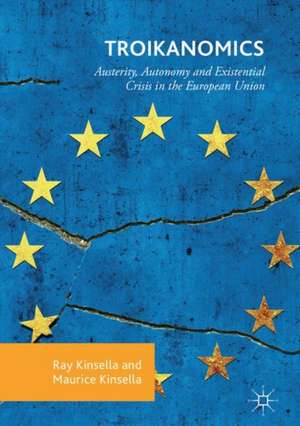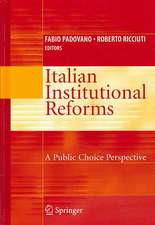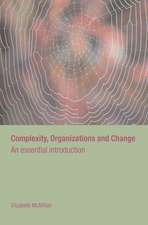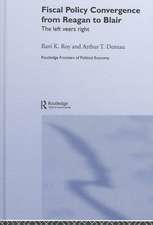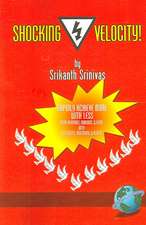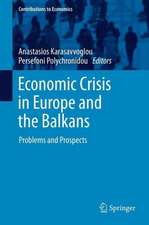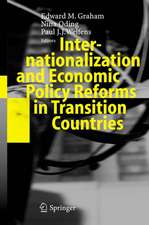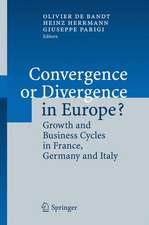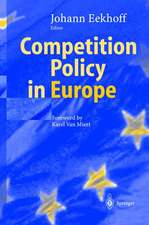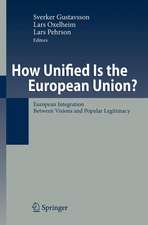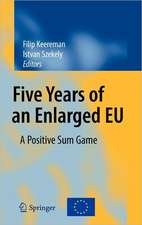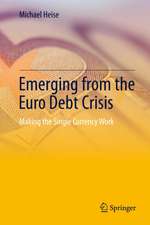Troikanomics: Austerity, Autonomy and Existential Crisis in the European Union
Autor Ray Kinsella, Maurice Kinsellaen Limba Engleză Paperback – 11 ian 2020
Ostensibly, the role of the Troika was to develop, coordinate and oversee the provision of conditional funding to support national governments in restructuring their economies. In fact, their power and influence extended far more widely. They enforced an unprecedentedly severe austerity programme of fiscal and structural adjustment through oppressive political oversight. Their practical impact was to impose on debtor countries in the EU periphery the single greatest economic and social dislocation in Europe’s recent history, thus corroding their autonomous capacities and enfeebling their national sovereignty.
The Troika’s word was law in those countries where its writ ran – Greece, Ireland, Cyprus, and to a more limited extent, Spain. It was answerable only to a trio of unelected organisations, far removed from the consequences of its policies on the lives of citizens. Widespread socio-political reaction to Troikanomics gave shape to the anti-austerity movement across the EU, characterised by the centre as ‘Populism’.
This book provides a timely response to the revisionist argument that there is no longer a ‘crisis’ in Europe. In their innovative analysis, the authors argue that Troikanomics is a manifestation of a deeper existential crisis within the EU that encompasses the centralisation of power, Brexit, Europe’s ominous militarisation and the progressive abandonment of its foundational values.
| Toate formatele și edițiile | Preț | Express |
|---|---|---|
| Paperback (1) | 522.42 lei 6-8 săpt. | |
| Springer – 11 ian 2020 | 522.42 lei 6-8 săpt. | |
| Hardback (1) | 700.61 lei 6-8 săpt. | |
| Springer International Publishing – 29 dec 2018 | 700.61 lei 6-8 săpt. |
Preț: 522.42 lei
Preț vechi: 614.61 lei
-15% Nou
Puncte Express: 784
Preț estimativ în valută:
99.96€ • 104.37$ • 82.73£
99.96€ • 104.37$ • 82.73£
Carte tipărită la comandă
Livrare economică 04-18 aprilie
Preluare comenzi: 021 569.72.76
Specificații
ISBN-13: 9783030404321
ISBN-10: 3030404323
Dimensiuni: 155 x 235 mm
Greutate: 0.28 kg
Ediția:1st ed. 2018
Editura: Springer
Colecția Palgrave Macmillan
Locul publicării:Cham, Switzerland
ISBN-10: 3030404323
Dimensiuni: 155 x 235 mm
Greutate: 0.28 kg
Ediția:1st ed. 2018
Editura: Springer
Colecția Palgrave Macmillan
Locul publicării:Cham, Switzerland
Cuprins
Chapter
One:
Foundations
of
the
Argument
Part I: Crisis and Catharsis in the Heartland of the European Union Chapter Two: A Critical Inflection Point for the EU
Chapter Three: The EU Experience: Confronting the Existential Realities of the Crisis
Part II: Development of the Crisis: Architecture, Agendas and Austerity
Chapter Four: European Monetary Union and the Challenge of Economic Integration
Chapter Five: The Troika and Austerity: A Destructive Dyad
Part III: Autonomy and the EU Experience Chapter Six: Autonomy Within the EU: A Relational Perspective
Chapter Seven: Case Studies: Exploring the Lived Reality of Troikanomics
Part IV: Where from Here? Charting the Trajectory of the EU
Chapter Eight: The EU as a Communal Endeavour: Ideal and Reality
Chapter Nine: Troikanomics: Legacy and Lessons
Part I: Crisis and Catharsis in the Heartland of the European Union Chapter Two: A Critical Inflection Point for the EU
Chapter Three: The EU Experience: Confronting the Existential Realities of the Crisis
Part II: Development of the Crisis: Architecture, Agendas and Austerity
Chapter Four: European Monetary Union and the Challenge of Economic Integration
Chapter Five: The Troika and Austerity: A Destructive Dyad
Part III: Autonomy and the EU Experience Chapter Six: Autonomy Within the EU: A Relational Perspective
Chapter Seven: Case Studies: Exploring the Lived Reality of Troikanomics
Part IV: Where from Here? Charting the Trajectory of the EU
Chapter Eight: The EU as a Communal Endeavour: Ideal and Reality
Chapter Nine: Troikanomics: Legacy and Lessons
Notă biografică
Ray
Kinsellabegan
his
career
as
an
economist
in
the
Central
Bank
of
Ireland,
before
being
appointed
Professor
of
Financial
Services
at
the
University
of
Ulster,
UK
and
subsequently
to
the
Faculty
of
the
Michael
Smurfit
School
of
Business
in
Dublin,
Republic
of
Ireland.
Maurice Kinsellareceived his PhD from the School of Philosophy at University College Dublin, Republic of Ireland. He lectures in philosophy and professional ethics at the Galilee House of Studies, Republic of Ireland. He has published widely on the subject of autonomy.
Maurice Kinsellareceived his PhD from the School of Philosophy at University College Dublin, Republic of Ireland. He lectures in philosophy and professional ethics at the Galilee House of Studies, Republic of Ireland. He has published widely on the subject of autonomy.
Textul de pe ultima copertă
The
‘Troika’
is
a
word
that
is
scorched
into
the
narrative
of
the
EU’s
banking
and
economic
crisis
–
a
triumvirate
constituted
by
the
European
Central
Bank,
the
European
Commission
and
the
International
Monetary
Fund.
The
modus
operandi
of
the
Troika
is
defined
by
the
authors
of
this
book
as
‘Troikanomics’.
Ostensibly, the role of the Troika was to develop, coordinate and oversee the provision of conditional funding to support national governments in restructuring their economies. In fact, their power and influence extended far more widely. They enforced an unprecedentedly severe austerity programme of fiscal and structural adjustment through oppressive political oversight. Their practical impact was to impose on debtor countries in the EU periphery the single greatest economic and social dislocation in Europe’s recent history, thus corroding their autonomous capacities and enfeebling their national sovereignty.
The Troika’s word was law in those countries where its writ ran – Greece, Ireland, Cyprus, and to a more limited extent, Spain. It was answerable only to a trio of unelected organisations, far removed from the consequences of its policies on the lives of citizens. Widespread socio-political reaction to Troikanomics gave shape to the anti-austerity movement across the EU, characterised by the centre as ‘Populism’.
This book provides a timely response to the revisionist argument that there is no longer a ‘crisis’ in Europe. In their innovative analysis, the authors argue that Troikanomics is a manifestation of a deeper existential crisis within the EU that encompasses the centralisation of power, Brexit, Europe’s ominous militarisation and the progressive abandonment of its foundational values.
Ray Kinsella began his career as an economist in the Central Bank of Ireland, before being appointed Professor of Financial Services at the University of Ulster, UK and subsequently to the Faculty of the Michael Smurfit School of Business in Dublin, Republic of Ireland.
Maurice Kinsella received his PhD from the School of Philosophy at University College Dublin, Republic of Ireland. He lectures in philosophy and professional ethics at the Galilee House of Studies, Republic of Ireland. He has published widely on the subject of autonomy.
Ostensibly, the role of the Troika was to develop, coordinate and oversee the provision of conditional funding to support national governments in restructuring their economies. In fact, their power and influence extended far more widely. They enforced an unprecedentedly severe austerity programme of fiscal and structural adjustment through oppressive political oversight. Their practical impact was to impose on debtor countries in the EU periphery the single greatest economic and social dislocation in Europe’s recent history, thus corroding their autonomous capacities and enfeebling their national sovereignty.
The Troika’s word was law in those countries where its writ ran – Greece, Ireland, Cyprus, and to a more limited extent, Spain. It was answerable only to a trio of unelected organisations, far removed from the consequences of its policies on the lives of citizens. Widespread socio-political reaction to Troikanomics gave shape to the anti-austerity movement across the EU, characterised by the centre as ‘Populism’.
This book provides a timely response to the revisionist argument that there is no longer a ‘crisis’ in Europe. In their innovative analysis, the authors argue that Troikanomics is a manifestation of a deeper existential crisis within the EU that encompasses the centralisation of power, Brexit, Europe’s ominous militarisation and the progressive abandonment of its foundational values.
Ray Kinsella began his career as an economist in the Central Bank of Ireland, before being appointed Professor of Financial Services at the University of Ulster, UK and subsequently to the Faculty of the Michael Smurfit School of Business in Dublin, Republic of Ireland.
Maurice Kinsella received his PhD from the School of Philosophy at University College Dublin, Republic of Ireland. He lectures in philosophy and professional ethics at the Galilee House of Studies, Republic of Ireland. He has published widely on the subject of autonomy.
Caracteristici
Questions
the
increasingly
prevailing
opinion
that
the
European
crisis
has
ended
by
providing
an
interdisciplinary
analysis
of
the
dynamics
of
the
European
response
to
it
Argues
Troikanomics,
more
than
any
other
institutional
innovation,
has
been
the
catalyst
for
and
the
abandonment
of
Europe’s
foundational
values
Examines
the
philosophical
underpinnings
to
Europe's
crisis
